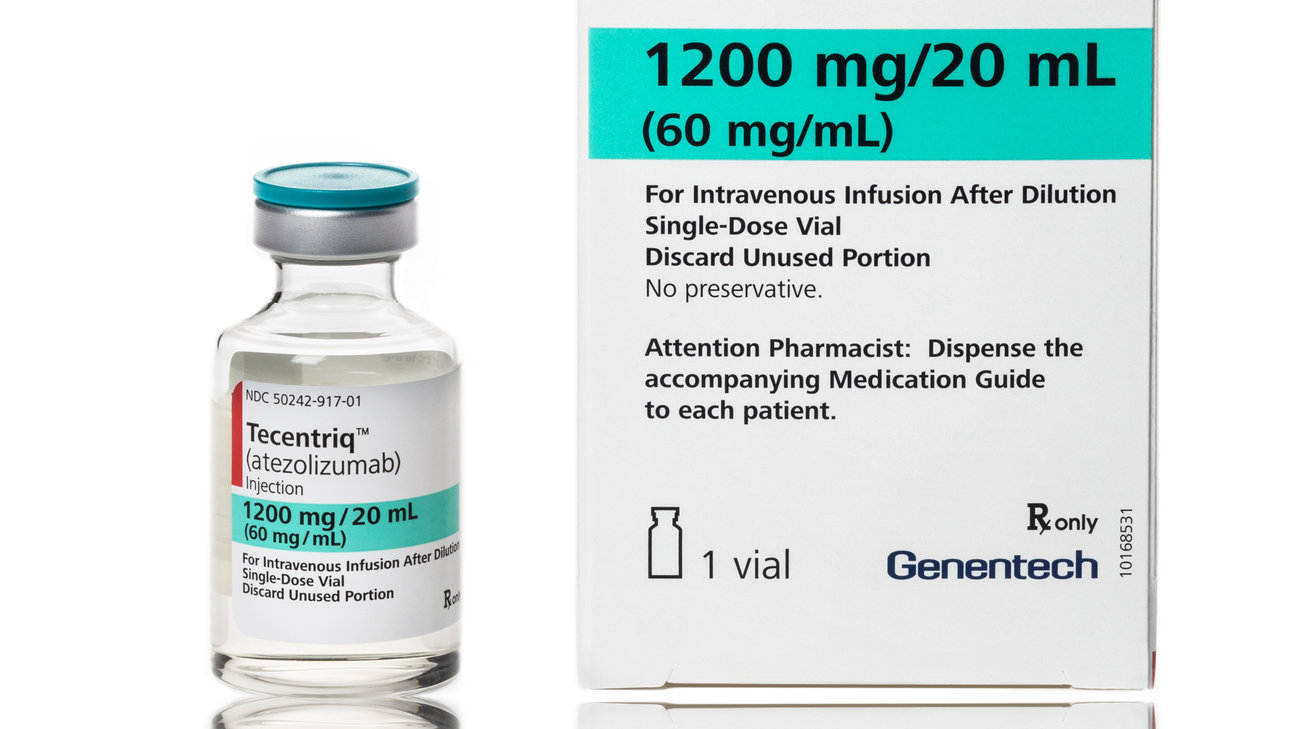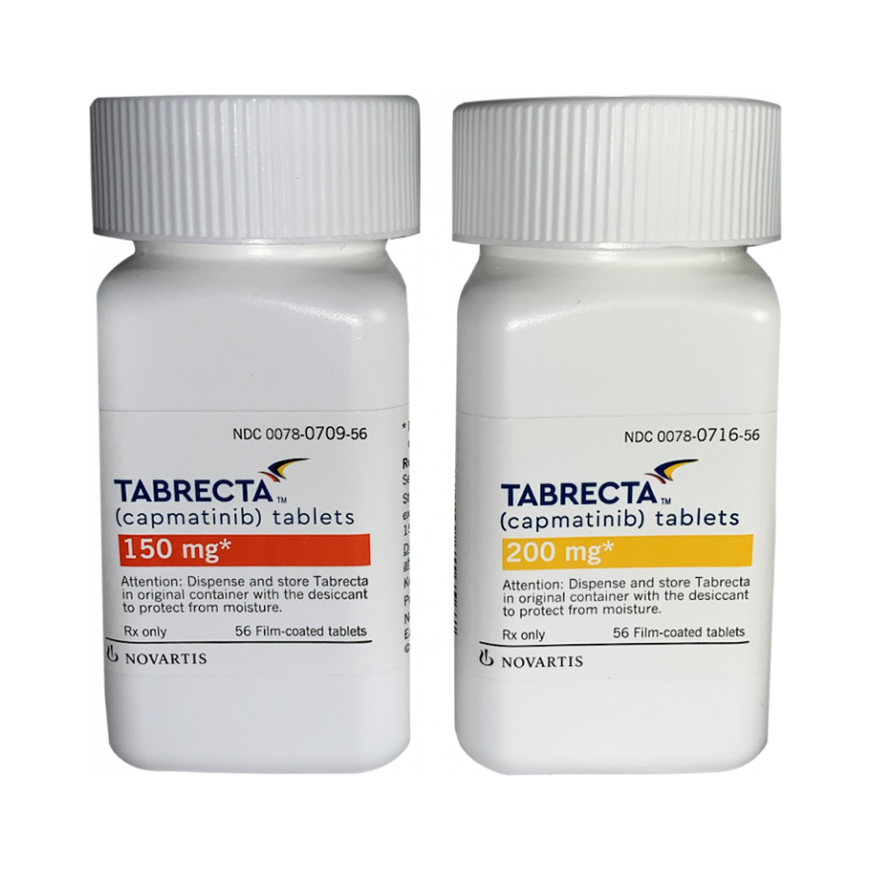Tecentriq (Atezolizumab) vs Tabrecta (capmatinib)
Tecentriq (Atezolizumab) vs Tabrecta (capmatinib)
Tecentriq (atezolizumab) is an immune checkpoint inhibitor that targets the PD-L1 protein and is commonly used in various types of cancer, including non-small cell lung cancer (NSCLC), urothelial carcinoma, and triple-negative breast cancer. On the other hand, Tabrecta (capmatinib) is a selective MET inhibitor indicated for the treatment of adults with metastatic NSCLC harboring MET exon 14 skipping mutations. The choice between Tecentriq and Tabrecta would largely depend on the specific genetic mutations present in the cancer, as well as the patient's overall health, cancer stage, and previous treatments, making it essential for a healthcare professional to evaluate the patient's condition to determine the most appropriate therapy.
Difference between Tecentriq and Tabrecta
| Metric | Tecentriq (Atezolizumab) | Tabrecta (capmatinib) |
|---|---|---|
| Generic name | Atezolizumab | Capmatinib |
| Indications | Urothelial carcinoma, non-small cell lung cancer (NSCLC), and triple-negative breast cancer (TNBC) | Non-small cell lung cancer (NSCLC) with MET exon 14 skipping mutations |
| Mechanism of action | PD-L1 inhibitor, immune checkpoint inhibitor | MEK inhibitor, targets MET exon 14 skipping mutations |
| Brand names | Tecentriq | Tabrecta |
| Administrative route | Intravenous infusion | Oral |
| Side effects | Fatigue, nausea, cough, shortness of breath, decreased appetite | Nausea, vomiting, fatigue, edema, decreased appetite |
| Contraindications | None known specifically; avoid in patients with severe hypersensitivity to atezolizumab or its components | None known specifically; avoid in patients with severe hypersensitivity to capmatinib or its components |
| Drug class | Monoclonal antibody, immune checkpoint inhibitor | Tyrosine kinase inhibitor |
| Manufacturer | Genentech (Roche) | Novartis |
Efficacy
Tecentriq (Atezolizumab) in Lung Cancer Treatment
Tecentriq (Atezolizumab) is a monoclonal antibody that is part of a class of drugs known as immune checkpoint inhibitors. Specifically, it targets the programmed death-ligand 1 (PD-L1), which is a protein that can prevent the immune system from attacking cancer cells. By inhibiting PD-L1, Tecentriq helps to restore the immune system's ability to detect and fight tumor cells. In the context of lung cancer, Tecentriq has shown efficacy in both non-small cell lung cancer (NSCLC) and small cell lung cancer (SCLC) when used either as a monotherapy or in combination with other treatments. Its effectiveness has been demonstrated in several clinical trials, leading to its approval for certain types of lung cancer by regulatory agencies such as the U.S. Food and Drug Administration (FDA).
Tabrecta (Capmatinib) and Its Role in NSCLC
Tabrecta (Capmatinib) is a kinase inhibitor that targets the MET gene mutations, which can lead to the development and proliferation of cancer cells. It is specifically indicated for the treatment of adult patients with metastatic non-small cell lung cancer (NSCLC) who have mutations that lead to MET exon 14 skipping. This mutation is present in a subset of NSCLC patients and is associated with poor prognosis. Capmatinib has been shown to be effective in shrinking tumors and slowing the progression of the disease in patients with this specific genetic alteration. The FDA granted accelerated approval for Tabrecta based on the overall response rate and duration of response observed in clinical trials.
Comparative Efficacy in Lung Cancer Treatment
When comparing Tecentriq and Tabrecta, it is important to note that they are used to treat different aspects of lung cancer and are not directly comparable in a head-to-head manner. Tecentriq is a broad immune checkpoint inhibitor that can be used for various types of lung cancer and works by modulating the immune system. In contrast, Tabrecta is a targeted therapy for NSCLC patients with a specific genetic mutation. The efficacy of each drug is highly dependent on the patient's individual cancer profile, including biomarkers and stage of disease.
Considerations for Lung Cancer Treatment
The choice of treatment with Tecentriq or Tabrecta, or a combination thereof, will depend on several factors, including the specific type and stage of lung cancer, the presence of certain biomarkers, the patient's overall health, and prior treatments. Physicians will typically conduct comprehensive testing to determine the most appropriate therapy for each patient. As with all cancer treatments, the efficacy of Tecentriq and Tabrecta can vary among individuals, and side effects must also be carefully managed to ensure the best possible outcomes for patients.
Regulatory Agency Approvals
Tecentriq
-
European Medical Agency (EMA), European Union

-
Food and Drug Administration (FDA), USA

-
Health Canada

-
Pharmaceuticals and Medical Devices Agency (PMDA), Japan

-
Therapeutic Goods Administration (TGA), Australia

-
Medsafe (NZ)

Tabrecta
-
European Medical Agency (EMA), European Union

-
Food and Drug Administration (FDA), USA

-
Pharmaceuticals and Medical Devices Agency (PMDA), Japan

Access Tecentriq or Tabrecta today
If Tecentriq or Tabrecta are not approved or available in your country (e.g. due to supply issues), you can access them via Everyone.org.
How it works

Make an enquiry
Choose the medicine you want to buy, answer a couple of questions, and upload your prescription to speed things up. We’ll get back to you within 24 hours.


Make an enquiry
Choose the medicine you want to buy, answer a couple of questions, and upload your prescription to speed things up. We’ll get back to you within 24 hours.


Breeze through the paperwork
We'll guide you through the required documents for importing unapproved medicine, ensuring you have all the necessary information.


Get a personalized quote
We’ll prepare a quote for you, including medicine costs and any shipping, administrative, or import fees that may apply.


Receive your medicine
Accept the quote and we’ll handle the rest - sourcing and safely delivering your medicine.

Some text on this page has been automatically generated. Speak to your physician before you start a new treatment or medication.
Let's talk
If you have any questions, call us or send us a message through WhatsApp or email:
Contact us




